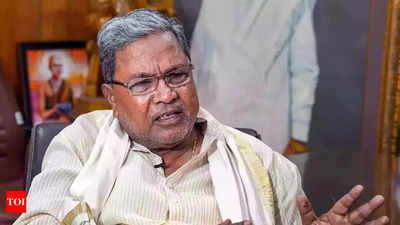- News
- City News
- bengaluru News
- Karnataka HC dismisses plea, CM Siddaramaiah to face Muda scam probe
Trending
Karnataka HC dismisses plea, CM Siddaramaiah to face Muda scam probe
The Karnataka High Court dismissed Chief Minister Siddaramaiah's petition challenging the governor's sanction to investigate allegations of illegal site allotments involving his wife. The court identified a prima facie case and stressed the need for an investigation. Siddaramaiah denied any wrongdoing, accusing opposition parties of engaging in vendetta politics.

"The facts narrated in the petition would undoubtedly require an investigation in the teeth of the fact that the beneficiary of all these acts is not anybody outside, but the petitioner's wife," Justice M Nagaprasanna observed in his order, pointing out that there is a prima facie case against the petitioner.


Rejecting demands for his resignation, the CM said he has not committed any wrong and accused the opposition parties of indulging in vendetta politics. "The court has only directed an inquiry into the Muda case, and that does not mean that I'm guilty," said 76-year-old Siddaramaiah, whose Mr Clean image of four decades is facing the biggest threat yet.
The high court said, prima facie, family members of Siddaramaiah obtained undue advantage in the site allotments, ample evidence of which seen in the fact that land was allocated in the heart of Mysuru city as compensation for land relinquished 40km away.
The court said the governor's order nowhere suffers from want of application of mind and the alleged haste does not vitiate the order. "The governor, in normal circumstance, must act on the aid and advice of the council of ministers, but can take an independent decision in exceptional circumstances. The present case is one such exception."
"If this were to be a case of a common man, he would not have fought shy of facing the investigation. In the opinion of the court, the CM, a leader of the proletariat, the bourgeois, and of any citizen, should not fight shy of any investigation. There is lurking suspicion, looming large allegations, and the beneficiary of Rs 56 crore is the family of the chief minister – the petitioner. Judged from these spectrums and analysed from the aforesaid premises, the irresistible conclusion is an investigation becomes necessary," the judge observed.
Justice Nagaprasanna declined the request made by senior advocate Abhishek Singhvi, appearing for Siddaramaiah, to continue the August 19 interim order staying all proceedings for another two weeks so as to enable the petitioner to appeal against the present order. A trial court is scheduled to take up the three private complaints filed against the CM and his wife on Wednesday.
On August 16, 2024, the governor had passed the order, according sanction under Section 17A of Prevention of Corruption Act for investigating the CM. The governor's order came on the applications from the three private complainants -- TJ Abraham, Snehamayi Krishna, and Pradeep Kumar SP.
Immediately, the CM moved the high court. On August 19, an interim order was passed, directing the trial court to defer its proceedings and not to take any precipitative action against the CM.
The CM claimed he had no role to play as many of the sequence of events occurred during the previous govts and added that the governor could not have ignored the advice tendered by the state cabinet or the reply submitted by him in response to the show cause notice dated July 26, 2024.
On the other hand, the governor's office submitted that the order in question is purely an administrative as well as an executive order and the same doesn't contemplate any prior hearing. The court was told that sanction was only under 17A of the Act to investigate the case.
The complainants submitted that key events related to the scam and highlighted by the complainants took place whenever Siddaramaiah was holding a position, twice as deputy CM, CM, and leader of the opposition, and added that his son Yathindra was a participant in the MUDA meetings as an MLA.
Though Siddaramaiah claimed that the complainant, TN Abraham, had criminal antecedents, Justice Nagaprasanna was of the view that such allegations cannot and can never mask the real issue that he has brought before the Governor. Even otherwise, all the allegations against Abraham are absolutely unfounded and deliberate mudslinging. "I deem it appropriate to observe that whistleblowers would sometimes face such allegations, particularly when they blow the whistle of corruption," the judge further observed.
"The complainants were justified in registering the complaint or seeking approval at the hands of the governor. The approval under Section 17A of the PC Act is mandatory in the situation. Section 17A nowhere requires a police officer to seek approval in a private complaint registered under Section 200 of the CrPC/223 of BNS against a public servant for offences punishable under the provisions of the Act. It is the duty of the complainant to seek such approval," Justice Nagaprasanna further observed.
Snehamayi Krishna's counsel told TOI that they have filed a caveat in the high court. Caveats are filed by succeeding parties to pre-empt the other side from securing ex-parte interim orders from higher benches.
End of Article
FOLLOW US ON SOCIAL MEDIA










